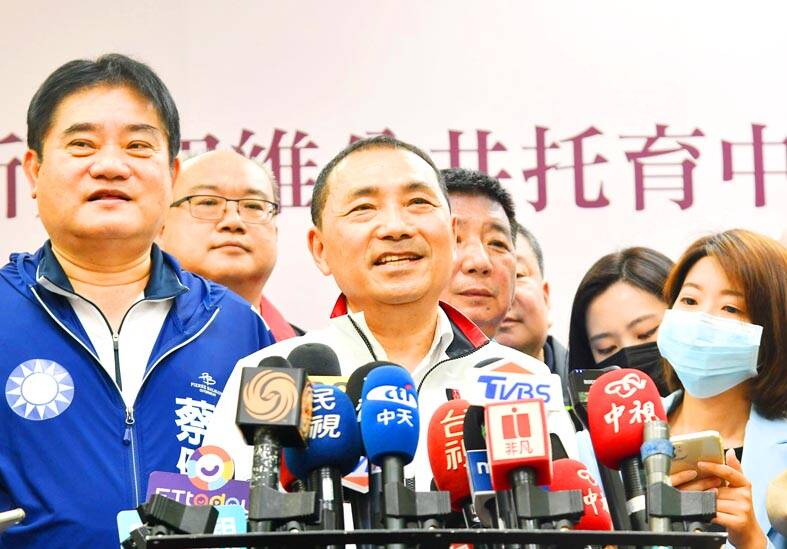New Taipei City Mayor Hou You-yi (侯友宜), widely seen as one of the frontrunners for the Chinese Nationalist Party’s (KMT) presidential nomination, is to visit Singapore today as part of “international diplomacy,” he said yesterday.
His remarks were interpreted by some as an indication he might soon officially declare he was running in next year’s presidential election.
New Taipei City “already closely interacts with Singapore,” he said of the reason for the trip, citing the use of technology from the city-state in New Taipei City’s Christmas light show last year.

Photo: CNA
Hou did not say whether he would meet with Singaporean Prime Minister Lee Hsien Loong (李顯龍).
He said he plans to visit Nanyang Technological University, which is “the most important start-up base in Singapore,” and would also visit companies and government departments, as well as host a symposium “to demystify how Singaporean youth create their own world.”
Four female city department heads would accompany him “to demonstrate the city’s emphasis on gender equality,” and would meet with Singaporean counterparts to discuss issues such as sustainable development, urban economics and culture, he said.
Separately yesterday, Democratic Progressive Party (DPP) Taipei City Councilor Yen Wei-tzu (顏蔚慈) said that Hou was traveling abroad to avoid responding to accusations that he committed bribery in 2014.
Former KMT member and political pundit Luo You-zhi (羅友志) on Monday said that Hou had tried to bribe him in exchange for not seeking the party’s nomination in the 2014 local elections.
The mayor’s trip was announced suddenly, and after the city government had previously said there were no plans for official visits abroad this year, Yen told a news conference in Taipei, alongside DPP spokesman Chang Chih-hao (張志豪), and DPP New Taipei City councilors Tai Wei-shan (戴瑋姍) and Chen Nai-yu (陳乃瑜).
“The timing of the trip, just as controversy has emerged surrounding Luo’s accusations, cannot be a coincidence,” she said.
Hou has avoided answering questions such as whether he met with Luo, whose interests Hou had been trying to protect in the 2014 local elections, and where the NT$5 million (US$163,789) bribe allegedly offered to Luo came from, Chang said.
“All Hou said [in response to questions] was: ‘Although Taiwan guarantees freedom of speech, it is still a democratic country ruled by law,’ which just left everyone with a lot of questions,” he said.

A strong continental cold air mass is to bring pollutants to Taiwan from tomorrow, the Ministry of Environment said today, as it issued an “orange” air quality alert for most of the country. All of Taiwan except for Hualien and Taitung counties is to be under an “orange” air quality alert tomorrow, indicating air quality that is unhealthy for sensitive groups. In China, areas from Shandong to Shanghai have been enveloped in haze since Saturday, the ministry said in a news release. Yesterday, hourly concentrations of PM2.5 in these areas ranged from 65 to 160 micrograms per cubic meter (mg/m³), and pollutants were

Taiwan’s armed forces have established response protocols for a wide range of sudden contingencies, including the “Wan Chun Plan” to protect the head of state, the Ministry of Defense (MND) said today. After US President Donald Trump on Saturday launched a series of airstrikes in Venezuela and kidnapped Venezuelan President Nicolas Maduro, concerns have been raised as to whether China would launch a similar “decapitation strike” on Taiwan. The armed forces regularly coordinate with relevant agencies and practice drills to ensure preparedness for a wide range of scenarios, Vice Minister of National Defense Hsu Szu-chien (徐斯儉) told reporters before a

EVA Airways on Saturday said that it had suspended a pilot and opened an investigation after he allegedly lost his temper and punched the first officer several times as their plane was taxiing before takeoff at Los Angeles International Airport. According to a report published on Thursday by The Reporter, the incident occurred after the flight’s Malaysian first officer tried to warn the Taiwanese pilot, surnamed Wen (文), that he was taxiing faster than the speed limit of 30 knots (55.6kph). After alerting the pilot several times without response, the first officer manually applied the brakes in accordance with standard operating

Japanese Councilor Hei Seki (石平) on Wednesday said that he plans to visit Taiwan, saying that would “prove that Taiwan is an independent country and does not belong to China.” Seki, a member of the Japan Innovation Party, was born in Chengdu in China’s Sichuan Province and became a naturalized Japanese in 2007. He was elected to the House of Concilors last year. His views on the Chinese Communist Party (CCP) — espoused in a series of books on politics and history — prompted Beijing to sanction him, including barring Seki from traveling to China. Seki wrote on X that he intends